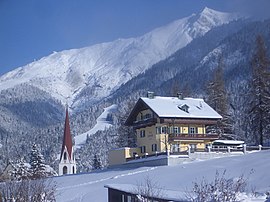
Back زيفيلد (تيرول) Arabic Seefeld in Tirol Catalan Зефельд-ин-Тироль CE Seefeld in Tirol (munisipyo) CEB Seefeld in Tirol Czech Seefeld in Tirol German Ζέεφελντ Greek Seefeld (Tirolo) Esperanto Seefeld in Tirol Spanish Seefeld Estonian
Seefeld in Tirol | |
|---|---|
 Seefeld in Tirol by wintertime | |
| Coordinates: 47°19′46″N 11°11′21″E / 47.32944°N 11.18917°E | |
| Country | Austria |
| State | Tyrol |
| District | Innsbruck Land |
| Government | |
| • Mayor | Werner Frießer (ÖVP) |
| Area | |
• Total | 17.38 km2 (6.71 sq mi) |
| Elevation | 1,180 m (3,870 ft) |
| Population (2018-01-01)[2] | |
• Total | 3,440 |
| • Density | 200/km2 (510/sq mi) |
| Time zone | UTC+1 (CET) |
| • Summer (DST) | UTC+2 (CEST) |
| Postal code | 6100 |
| Area code | 05212 |
| Vehicle registration | IL |
| Website | www.seefeld.eu |
Seefeld in Tirol is an old farming village, now a major tourist resort, in Innsbruck-Land District in the Austrian state of Tyrol with a local population of 3,312 (as of 1 January 2013). The village is located about 17 km (11 mi) northwest of Innsbruck on a plateau between the Wetterstein mountains and the Karwendel on a historic road from Mittenwald to Innsbruck that has been important since the Middle Ages. It was first mentioned in 1022 and since the 14th century has been a pilgrimage site, benefiting not only from the visit of numerous pilgrims but also from its stacking rights as a trading station between Augsburg and the Venice. Also since the 14th century, Tyrolean shale oil has been extracted in the area. Seefeld was a popular holiday resort even before 1900 and, since the 1930s, has been a well known winter sports centres and amongst the most popular tourist resorts in Austria. The municipality, which has been the venue for several Winter Olympics Games, is the home village of Anton Seelos, the inventor of the parallel turn.
With more than one million overnight stays each year, it is one of the most popular Tyrolean tourist destinations especially for skiing in winter, but also for walking holidays in the summer.
- ^ "Dauersiedlungsraum der Gemeinden Politischen Bezirke und Bundesländer - Gebietsstand 1.1.2018". Statistics Austria. Retrieved 10 March 2019.
- ^ "Einwohnerzahl 1.1.2018 nach Gemeinden mit Status, Gebietsstand 1.1.2018". Statistics Austria. Retrieved 9 March 2019.

